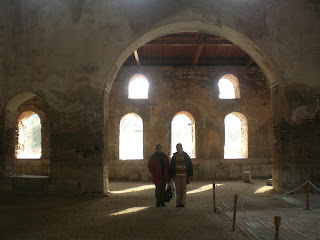Siguiendo la sugerencia de Bente, hicimos una reunión en la que se pasó una encuesta sobre diferentes temas relacionados con la emigración. Los resultados fueron los siguientes.
CONSIDERACIONES SOBRE LAS CONTESTACIONES DE LA 7ª CONVOCATORIA
De los veinte alumnos que participan en este proyecto, cuatro de ellos no pudieron asistir y de los restantes, otros cuatro son eurocomunitarios y tres más venezolanos que no se consideran emigrantes.
En la séptima convocatoria del grupo el 30/10/09 se les entregó una serie de preguntas sobre el fenómeno migratorio, que habrían de contestar reflexivamente, para en una sesión posterior entablar un coloquio para el intercambio de ideas, coloquio este que se gravó en video y resultó altamente interesante.
No es fácil hacer un análisis de las contestaciones, dado lo heterogéneo del grupo y tratarse de preguntas abiertas, hechas más para la subjetividad y que pretendían tan sólo una reflexión para el posterior intercambio de ideas, por lo que solamente se puede hacer un breve esquema donde, a lo más, se vislumbren unas tendencias.
Siguiendo las preguntas planteadas y se según las respuestas:
1.- ¿Por qué tuviste que emigrar? : El 80% contesta que por motivos económicos y otras razones distintas al hecho migratorio.
2.- ¿Cómo repercutió tu decisión en tu familia? : La mitad nos dice que se aceptó su decisión.
3.- ¿Qué pasos seguiste para poder emigrar? : Para un 50%, conseguir visado y/o pasaporte.
4.- ¿Cómo fue el viaje y cuales fueron tus sensaciones y sentimientos? : Para un 40% normal y otro 40% nostalgia y tristeza.
5.- ¿Qué impresiones recibiste en tus primeros contactos en el país de acogida? : Un 70% responde que fueron buenas.
6.- Pasos a seguir para establecer tu residencia, si es que fue así: El 50% conseguir un trabajo y legalizarse.
7.- Si tu situación aquí ha sido forzosa, ¿qué pasos seguirías para quedarte? : La mitad no contesta y el resto, buscar trabajo y legalizarse.
8.- ¿Crees que el proceso administrativo favorece o dificulta el establecimiento? : Un 40% piensa que lo dificulta y otro 40% que varía según las circunstancias.
9.- En tu vivencia día a día, ¿cómo ha sido tu convivencia con los autóctonos?: La mayoría considera que buena o normal.
10.- ¿Piensas que las instituciones son eficaces? : La mayoría contesta que la educación y la sanidad sí, pero no otras instancias administrativas.
11.- ¿Las embajadas de tu país te han prestado la ayuda debida?: La mayoría dice que sí o que no fue necesaria.
12.- En el caso de haberte integrado, ¿qué relación guardas con tu país y tu familia?: La mayor parte responde que buena y frecuente.
13.- Cómo planteas tu futuro, quedarte o marchar: Más del 50% quedarse y el resto duda o marchar.
14.- ¿Qué significado tiene para ti ser emigrante?: Un 40% no se considera emigrante y de uno de ellos recogemos su pensamiento:
“Ser emigrante significa esperanza, sueños, lucha, humildad, privaciones, falta de cariño, ansia de triunfo, inseguridad y… a veces hambre. No es nada fácil vivir lejos de tu casa, de tu gente, de tu tierra donde no tienes que agachar la cabeza para cada solicitud o dolencia, aunque sea pertinente y de lo más normal. Es para mí una dura lección de vida, pero mis sueños se harán realidad… El tiempo lo dirá, no me rindo.”(reflexión de uno de nuestros alumnos)
 At the suggestion of Bente, we had a meeting in which our students realized a survey about various topics related to migration. The results were as follows.
At the suggestion of Bente, we had a meeting in which our students realized a survey about various topics related to migration. The results were as follows.
REMARKS ON THE ANSWERS OF THE 7th CALL
Of the twenty students that are taking part in this project, four of them could not attend and of the remaining, four of them belong to the EU and other three are Venezuelan, who do not consider themselves emigrants.
In the seventh meeting of the group, held on 30/10/09, a series of questions on the migratory phenomenon was handed out to them. They were asked to think carefully about them before answering, so that we could discuss about these questions and exchange opinions in a subsequent meeting. This discussion, which turned out highly interesting, was recorded in a video.
It is not easy to do an analysis of the answers, due to the heterogeneity of the group and because the questions were open, asked to allow the subjectivity of the answers and inviting to reflection in order to exchange ideas, so we can only do a brief outline which may help us to discern some trends.
Following the questionnaire and according to the answers:
1.- Why did you have to emigrate? : 80% answered that because of economic reasons and other reasons different from the migratory fact.
2.- How did your decision affect your family? : Half of the people said that their decision was accepted.
3.- Which steps did you have to follow to emigrate? : 50% said they had to achieve visa and/or passport.
4.- How was the trip and what about your feelings? : 40% described it as normal and another 40% said to have felt homesickness and sadness.
5.- Which were your impressions on your first contact with the host country? : 70% answered that they felt good impressions.
6.- Steps to follow to establish your residence, if you did it: 50% answered to get a job and legalise their situation.
7.- If your situation here has been compulsory, which steps would you follow to stay? : Half of the people did not answer and the rest said they would look for a job and legalise their situation.
8.- Do you think that the administrative process favours or hampers the establishment? : 40% thinks that bureaucracy hampers it and another 40% thinks that it depends on the particular circumstances.
9.- How has your everyday life been with the native people?: Most people consider it good or normal.
10.- Do you think that the institutions are effective? : The great majority answered that education and health are effective, but not other administrative instances.
11.- Have the embassies of your country given you suitable aid?: The majority says yes or that aid was not necessary.
12.- In the case you are integrated in the host country, which relation do you have with your own country and family?: Most people answered that they have a good and frequent relationship.
13.- What are your plans about the future: stay here or go away? More than 50% say they would like to stay and the rest has doubts or would like to leave.
14.- What does being an emigrant mean, according to you?: 40% does not consider themselves emigrants and we would like to report one of the participants’ thoughts.
“Being an emigrant means hope, dreams, fight, humility, suffer privation, lack of affection, eagerness to success, insecurity and…sometimes hunger. It is not at all easy to live far away from your house, your people, and your country where you do not have to lower your head in front of each application or complaint, in spite of being this appropriate and completely normal. For me it is a hard lifelong lesson, but my dreams will come true… time will tell, I do not give up.”
(reflexión of one of our students)

 Derived from Greek oikoumenikos, "ecumenical" literally means "worldwide" but generally is assumed to be limited to the Roman Empire, as in Augustus' claim to be ruler of the oikoumene/world; the earliest extant uses of the term for a council are Eusebius' Life of Constantine 3.6 around 338 (he convoked an Ecumenical council), Athanasius' Ad Afros Epistola Synodica in 369, and the Letter in 382 to Pope Damasus I and the Latin bishops from the First Council of Constantinople.
Derived from Greek oikoumenikos, "ecumenical" literally means "worldwide" but generally is assumed to be limited to the Roman Empire, as in Augustus' claim to be ruler of the oikoumene/world; the earliest extant uses of the term for a council are Eusebius' Life of Constantine 3.6 around 338 (he convoked an Ecumenical council), Athanasius' Ad Afros Epistola Synodica in 369, and the Letter in 382 to Pope Damasus I and the Latin bishops from the First Council of Constantinople.


















.jpg)


















